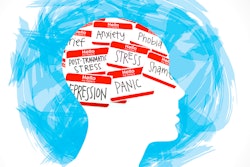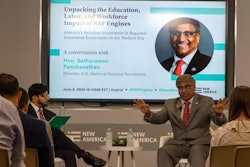Dr. Michael Gavin, Delta College’s fifth president, grew up on the north side of Chicago, where his classrooms and sports teams were diverse until the eighth grade. In high school, he began to notice change.
“By the time I got to high school, I was in honors and AP classes, where my African American and Hispanic friends were, for lack of a better way to put it, tracked into regular or remedial classes,” says Gavin in an interview with Diverse. “I didn’t have the words for it then, but I could see how education was reproducing social oppression, racial oppression, and economic oppression.”
Since witnessing this, Gavin has spent his career working towards reducing inequities for historically marginalized students. “And that’s carried me all the way to this presidency,” he adds.  Dr. Michael Gavin
Dr. Michael Gavin
Delta College is a two-year public community college in University Center, Michigan. What makes the institution unique is its critical focus on social justice.
“I mean, the mission is very clear,” says Gavin. “You’ve heard this a million times, but Higher Ed is marginalizing the same people over and over again, so you have to disrupt the system.”
Gavin, who is in his fourth year as president at Delta, received his doctorate in American studies from the University of Maryland, College Park, his master’s degree in literature from American University, and a bachelor’s degree in literature from Dickinson College.
Before serving at Delta, Gavin worked at Prince George’s Community College for 13 years and Anne Arundel College for seven years, both located in Maryland.
Delta’s Guiding Pillars: Equity and Completion
Led by Gavin, the Delta faculty and staff are focused on two key pillars: equity and completion.
“Probably the coolest part about the work that we’ve done in the last 3 years, but it manifested in data from this year, was our graduation rate,” says Gavin. “Numbers went up 10% in one year, 19% for African Americans and 20% for Hispanic [students].”
Shelly Raube, vice president of student empowerment and success at Delta College, says that the institution is focused on making sure everybody belongs and that they see themselves “as a valued member of our community.”
 Shelly Raube
Shelly Raube
One of Gavin’s goals for Delta is to increase the graduation rates across all three counties that Delta serves while also elevating the lives of the community’s people. To do this, Delta officials say that they are meeting their community where they are.
“We serve a very diverse area. We serve Midland, Michigan, Saginaw, and Bay City, and we actually are trying to embrace the real, full concept of equity,” says Gavin, who is the author of The New White Nationalism in Politics and Higher Education: The Nostalgia Spectrum. “So you know, we’ve gotten some sites out in the rural area and penetrated the Saginaw area significantly to people who were not thinking about college or coming to college,” he says.
Gavin’s commitment to making the institution more equitable and accessible by expanding its reach into neighboring communities began before he started his role.
“I heard, even during my interview process, over and over again that especially in Saginaw City, Delta had not done its due diligence and had lost the trust of a lot of the community members,” he says. “So that was like a priority for me right coming in.”
Once students enroll at Delta, Raube’s priority is to ensure that student support services and resources are accessible to them. She does this by empowering staff to be welcoming and ready to support.
“I want to make sure that our staff are fully prepared to open that invitation up, so those students feel like they can tell their story, that we understand their diverse background, and that we can provide the resources they want,” she adds.
Raube describes Delta as a community that is always striving towards excellence without getting too comfortable with its remarkable progress.
“Because the minute we say we’re excellent at something, then we stop growing and learning,” she says. “One can never be excellent when we’re trying to have a sense of belonging and inclusive culture because there will always be somebody that doesn’t feel they’re a part of it for whatever reason.”
This ongoing process requires constantly critiquing and questioning current systems and structures.
“Part of my role is looking at systems, looking at our policies, looking at our current processes, [and] looking at how we have the students flowing through the journey right now,” she says. “Do we have systemic barriers in place because that’s the way we’ve always done it? Do our policies align? Do they support all our students from all backgrounds that our students come from?”
Raube, who has been vice president since April 2024, but has been at Delta for 16 years, says that the college community is inspired by Gavin’s vision.
“I think our culture is good right now at Delta since Dr. Gavin has been here,” says Raube. “His mission for equitable education has been contagious across the institution, and student stories sustain it. If higher education leaders focus solely on numbers, he believes they might miss out on how to care for the people they serve.
“I think the one thing I learned the most is it’s okay to be emotional and focus on the feelings,” she says. “Actually, it’s important to focus on people’s feelings just as much as the data.”
A former athlete who carries his competitive spirit with him daily, Gavin is also outcomes driven. “I want to be number one, so those things drive me,” he says.
Another strategy Gavin has implemented to continue pushing Delta towards number one is consistent conversations and investments in Delta’s strategic plan.
“We’ve put something like two million dollars of our budget, like our general fund, in the last three and a half years, towards resources and or positions for student support, including mental health counselors,” he says. “We’re not going after a fancy building, we’re going after student success with our money and our resources and our time.”
One way Delta is investing in student success and support is through mentorship. To alleviate feelings of isolation among the student body, the institution initiated the Delta Mentor Collective mentoring program, offered in partnership with Mentor Collective.
“We started it last October as a pilot, and we really wanted to focus on students of color, especially single parents,” says Raube. “We noticed that there was an opportunity gap there, and we felt mentorship could support.”
Over 200 students participated in the program’s first nine months and were mentored by Delta faculty and staff members.
“The most notable data that came out of the first year of our mentor program at Delta College was the positive impact on sense of belonging, increase in student self-efficacy, and students’ academic help-seeking behaviors,” says Chris DeEulis, Director of Belonging, Equity, Diversity, and Inclusion at Delta College.
One of the unique aspects of the program is that students can choose what factors matter most to them in a mentorship relationship.
“Whether they are looking for someone with similar lived experience, has gone through a similar academic program, or shares some of their identities, centering the students’ voice in that pairing is important for them to feel comfortable connecting with the mentor,” says DeEulis. “We see this come out through the qualitative data from the program so far. These data show that the students feel that they are getting what they need to feel better connected into community and support resources at Delta.”
Delta will introduce a peer mentorship model in the second year of the program, and the number of participants has already doubled.
“Since we’ve started this mentoring program, we’ve saved so many students,” says Raube. “They thought their only path was to leave college.”
Raube says Delta is committed to putting a net around their students.
“Our students are going to fall, but they’re going to hit a net, and we’re their net,” she says. “They’re not going to fall so far that they have to leave; they just have to connect with one person.”
Gavin and Raube’s long-term vision for Delta includes becoming a community college that is home to prospective and current students in the region, regardless of their non-academic life barriers.
“Delta College has to be ready for our students. We can’t expect our students to be ready for college,” says Raube. “There’s a lot of things that have been thrown at our students and our community and the world over the last several years. How do we help them succeed? We are a college where, when we recognize a need, we will provide resources.”





















